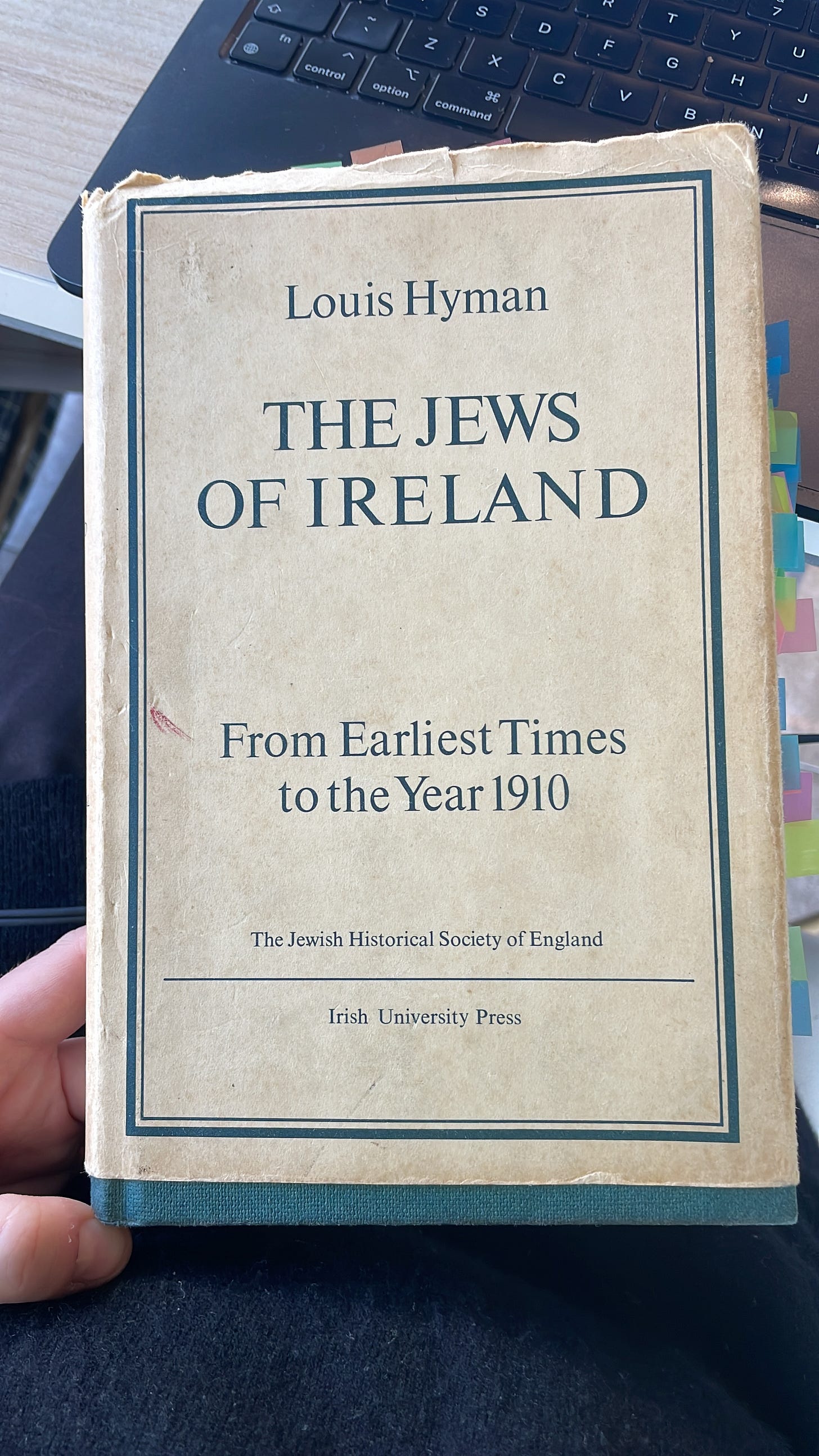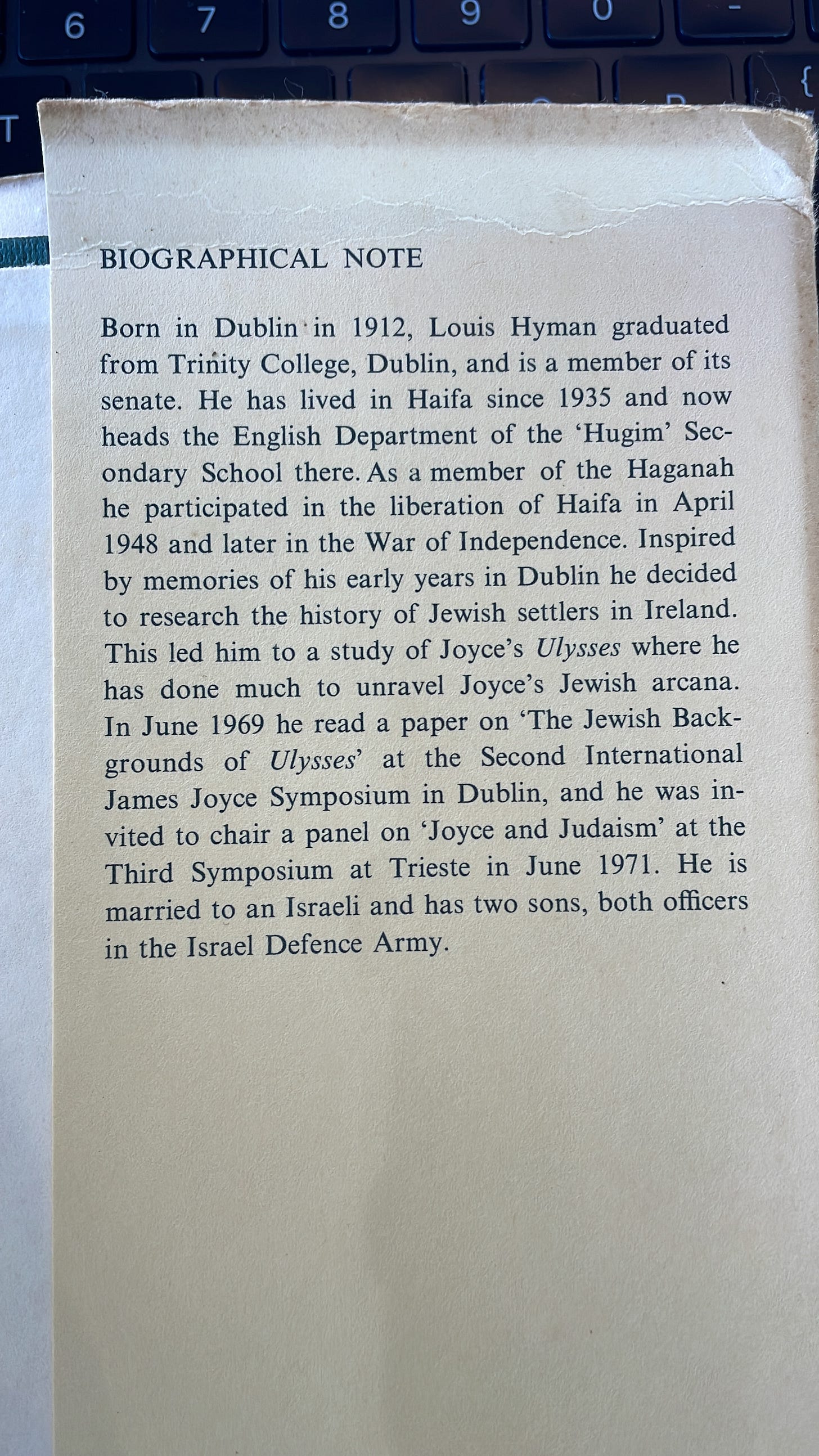Gaza, famine and some Irish history
Hello from Ramallah and I hope everyone is having a good start to 2024.
Sadly, many Irish-Palestinian families spent new year’s apart. Several Irish citizens and their close relatives have been denied permission by Israel to leave war-ravaged Gaza. You can read about some of their stories here and how one Irish-Palestinian man has lost some 150 members of his wider clan due to Israeli strikes.
I also gave an update to RTE Drive Time on escalating tensions across the Middle East here (I’m on around 1 hr 15 mins into the show.)
Some pieces that are worth your time this week:
The Daily goes through polling figures on how different generations of American view the conflict between Israel and Palestine and which group they support.
After the assassination of Saleh al-Arouri in southern beirut, you can read about the background to the presence of Hamas in Lebanon from L’Orient Today here.
And some poetry - Silence for Gaza by Mahmoud Darwish
For the next few weeks this newsletter is going to include some excerpts from two books on the history of Irish Jews. Why include these excerpts you might ask? I came across a tweet during the war that described Ireland as “the most anti-semitic country in Europe”, while one user messaged me on X(Twitter?) to say that Ulysses is conclusive evidence that Ireland is anti-semitic.
There were a range of quick and perhaps even witty responses that I could have delivered to these tweets but I actually thought it was a good prompt to do some properly reading on the history of Irish Jews and anti-semitism in Ireland.
The first book I’ve looked at is “The Jews of Ireland: From Earliest Times to the Year 1910” by Louis Hyman.
Hyman who was born in Dublin in 1912 and attended Trinity College, Dublin. He emigrated to Haifa in 1935 and was a member of the Haganah, the Jewish paramilitary organisation that, among other activities, violently fought for control of Palestinian territory which formed the state of Israel in 1948.
One of the chapters that I’ve included extracts of below is “Chapter XV: COOPERATION BETWEEN THE IRISH AND THE JEWS IN THE NINETEENTH CENTURY” which talks about how Irish and Jews political group supported each other in their campaign for emancipation while under British rule and also how several Jewish groups fundraised for Irish famine relief efforts in the 1840s.
As the UN and several NGOs warn of famine in Gaza, the speech made by Rabbi Jacques Judah Lyon in New York in 1847 urging his congregation to donate to the Irish famine relief efforts, which is at end the end of this newsletter, seems timely once again.
Extracts
In their struggle for political emancipation, the Jews of England found many a champion in Ireland. Daniel O’Connell, the ‘Liberator’,’father of Catholic emancipation,’ Richard Whately, Protestant Archbishop of Dublin, and Isaac Butt, the first ‘Home Ruler,’ are names that come to mind. Irish and Jewish leaders often met in London to discuss ways and means to remove the disabilities which they shared.
In 1829, for instance, at the house of John M. Pearce in St. Swithin’s Lane, Isaac Lyon Goldsmid and Moses Montefiore met Daniel O’Connell and his son, Morgan, the O’Gorman Mahon, his young and dare-devil lieutenant, Charles Pearce, Pearce Mahony, and John Wyse. It was John Pearce whom the Board of Deputies invited to prepare the Jewish petition to Parliament.
On 11 September 1829, O’Connell thanked Isaac Lyon Goldsmid, a financier and one of the leading figures in the movement for Jewish emancipation in Britain, for his congratulations on successfully securing Catholic emancipation.
‘Ireland’, O’Connell said, ‘has claims on your ancient race, as it is the only country that I know of unsullied by any one act of persecution of the Jews. I entirely agree with you on the principle of freedom of conscience, and no man can admit the sacred principle without extending of conscience, and no man can admit the sacred principle without extending it to the Jew as to the Christian… With these sentiments you will always find me. the constant and active friend to every measure which tends to give the Jews an euqality of civilian rights with all the king’s subjects - a perfect unconditional equality. I think ever day a day of injustice until that civil equality is attainted by the Jews. Command my unequivocal and energetic exertions in Parliament to do away with the legal forms and the laws which now ensnare or impede the conscientious Jew in seeking for those stations to which other subjects are entitled…”
A contemporary cartoon shows the Duke of Wellington and Sir Robert Peel blocking the entrance of the Jew to the House, while O’Connell and Baron Broughton, Chief Secretary for Ireland in March-April 1833, express their sympathy with him. O’Connell in the centre of the picture says: ‘Agitate, friend Moses, Agitate! That’s the way I got in.’
O’Connell, with John Dillion, Dr Alexander McCaul and the poet Campbell, attended a non-denominational mass meeting at the London Mansion House on 3 July 1840 to protest against the Damascus blood libel [The Damascus affair of 1840 refers to the arrest of several notable members of the Jewish community in Damascus on the accusation of murdering Father Thomas, a Christian monk, and his Muslim servant for the purpose of using their blood to bake matzo, an antisemitic accusation also known as the blood libel.]
O’Connell spoke passionately: “Is not a Jew in every relation of life an example? Is he not a good father? a good son? Are they not true friends? Are they not honest, industrious? I appeal to all Englishmen to raise their voices in defence of the victims of that shameful oppression. May the appeal go from one end of the British Isles to the other, and if the concurrence of an Irishman be wanting, here am I to testify it!
***
In 1833, over two hundred citizens of Waterford had presented a petition to the English Parliament in favour of the Bill to remove the civil disabilities of British Jewry.
Isaac Butt, afterwards leader of the Irish Parliamentary party, speaking on the Jewish Disabilities Bill in the House of Commons on 10 December 1857, said: ‘So long as we followed the principles of Christianity in our conduct character and set a better example to other nations than by the retention of a useless phrase '[‘the true faith of a Christian’ in the Parliamentary oath] which a man who has no Christianity would use, but from the adoption of which a man of sensitive conscience would shrink.”
***
Jewish support for Irish famine relief
The editor of a Dublin paper, The Inspector, in its issue of 14 September 1850, under the caption ‘Jewish Antiquity in Ireland’, pleaded for civil and religious liberty throughout the world, terming the parliamentary rejection of Baron Lionel de Rothschild, twice chose by the electors of the City of London, ‘a shabby technicality’. Here was a man of ‘first-rate standing in society, of great intelligence and excellent personal character, who, with his family, has contributed during the Irish famine of 1847, £10,000, a sum far beyond the joint contributions of the Devonshires, and Herefords, Landsdownes, Fitzwilliams and Herberts, who annual drew so many times that amount from their Irish estates.
***
In the winter of 1845-6, Ireland was stricken by a potato famine which left it a giant graveyard. The relief measures taken by an unprepared Government were almost useful and outside aid, in which British and American jews were prominent, was the sole salvation. An Irish Famine Loan of £8,000,000 was negotiated by Baron Lionel de Rothschild, who waived all commission.
Rothschild also helped to form the British association for the relief of the extreme distress in the remote parishes of Ireland and Scotland and which aimed to relieve the ‘very numerous class of the sufferers … who are beyond the reach of the Government … by the distribution of Food, Clothing and Fuel; but in no cases shall money be given to the parties relieved.
The Association collected over £470,000, of which £391, 000 was expended in Ireland; in the original subscription list, preserved in the National Library in Dublin, Queen Victoria heads the lists with a gift of £2,000, followed by Rothschild’s £1,000.
Throughout the period of extreme pressure, Baron Rothschild was indefatigable, especially in regulating the purchase and shipment of provisions to Ireland and in the interior; once, a vessel having arrived in the Thames laden with wheat consigned to his firm, he gave orders for her to sale to Cork forthwith.
***
In America in 1847, the trustees of the Shearith Israel congregation also responded at immediately to the Irish famine. A meeting took place at the synagogue in Crosby Street on 8 March ‘for the purpose of taking measures for the relief of the famishing thousands of their fellow-mortals in that unfortunate and destitute country, Ireland.’
The Rabbi Jacques Judah Lyon (1813-71) spoke movingly: ‘We are told that we have a large number of our own poor and destitute to take care of, that the charity we dispense should be bestowed in this quarter, that the peculiar position of ourselves an dour co-religionists demands it at our hands, that justice is a higher virtue than generosity, that self-preservation is a law and principle of our nature… Ask yourselves if the contribution you are request to make will diminish in the smallest degree the other calls which you admit are imperative and binding... It is true that there is but one connecting link between use and the sufferers that while most others know only a political and geographical separation from them, we alone realise that formidable and eternal one which the hand of man made not … Forged as it was, by religion, virtue and charity it is indestructible, it is all-powerful. That link my brethren, is Humanity!’
Uriah H. Judah, a New York merchant, the next speaker, used these words: ‘And for whom do I plead? for Ireland, unhappy Ireland! the birthplace of that [Thomas] Emmet, who stood unrivalled for the splendour of his talents and the brilliance of his legal attainments; for the land of that departed martyr, who in the last moments of existence - ay - when his grave was opening to receive him - promulgated the noblest sentiments of the human hearts, in accents soul-stirring and eloquent, in language beautiful and sublime.
As American citizens, are we not under great and lasting obligations to the people of Ireland? On the bloody field of battle, during our struggles for libery, were there no Irish men engaged in the contest? no generous and daring son of the Emerald Isle, that nobly and bravely stepped forward to the rescue? He who fell at Quebec, while leading on your troops and urging them to victory, drew the first breath of life in Ireland persecuted’s clime; and he, whose tomb has been bedewed with the tears of his mourning countrymen, that illustrious soldier and conquering general, who for two successive terms filled the highest office within your gift, was born of Irish parents.
And now, let me ask you if Ireland has no claims upon our sympathy, no demands upon our friendship, for services rendered int he darkest hours of adversity, in our conflict for liberty, in our struggle for equal rights? But, admitting that we act up to the principle that individuals as well as nations are ungrateful, has she then no claims upon us on the broad ground of charity, and of its heavenly attribute, brotherly love?






